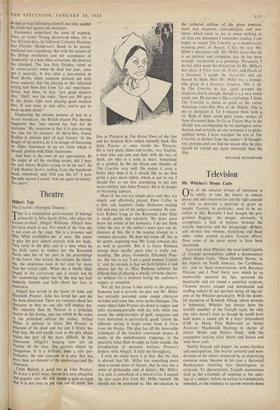Theatre
Miller's Tale THIS is a tremendous performance. It belongs primarily to Miss Sarah Miles, who plays the accuser-in-chief, Abigail Williams. Abigail does
not have much to say. For much of the time she Is not even on the stage. She is a presence and Miss Miles establishes her at once. She seems to play the part almost entirely with her body. Very early in the play and at a time when he has little cause to suspect her the Reverend Parris asks her of her part in the proceedings in the forest. One notices the coyness, the blush- ing, the suspicious look in her eyes far more than her actual reply. When she is finally chal- lenged in the courtroom one is struck not by her stammering replies but by the way her hair suddenly loosens and falls about her face in Confusion.
Abigail has served in the house of John and Elizabeth Proctor. John has loved her and she has been dismissed. There are rumours about her Character so that no one else will employ her. Her rejection then by Proctor is a principle motive in the drama, and one which in the notes to the published edition the author, Arthur Miller, is anxious to stress. But Proctor is ashamed of his deed and has put it firmly be- hind him. He will hardly look at the girl, which 'takes her part all the more difficult. In the Courtroom Abigail's longing eyes are on Proctor all the time. She receives almost no recognition. It is a brilliant, even a solo per- formance, the one constant in a play that has
'tore than an element of the pretentious and the
him as Pizzarro in The Royal Hunt of the Sun and his Sergeant Kite comes instantly back. His John Proctor at once recalls his Pizzarro. He is very plain, blunt and earthy, very English, a man who can .cuss and fight with the best of them, yet who is a saint at heart. Something of a symbol, he fits the blood and thunder of The Crucible very well. He makes it seem a better play than it is. I should like to see him given a part more subtle, which is not to say I should like to see him attempting to put any more subtlety into John Proctor. He is in danger of becoming typecast.
Most of the rest are simple parts and they are simply and effectively played. Peter Cellier is a fine, tall, legalistic Judge Hathorne making full and easy use of his judge's costume. By con- trast Robert Lang as the Reverend John Hale is small, gentle and scholarly. We never quite know the extent of his humanity. I do not think either the text or the author's notes give any in- dication of this. He is the nearest attempt to a rounded character. He does not come off, but in his gentle, inquiring way Mr. Lang conceals this as well as possible. But it is Joyce Redman among these smaller parts who is really out- standing. She plays Goodwife Elizabeth Proc- tor. She has to say 'I am a good woman. I know it,' and the miracle is that we both believe it and admire her for it. Miss .Redman achieves the difficult feat of playing a wholly virtuous charac- ter without for a moment losing the audience's respect or attention.
Not all this praise is due solely to the players. Someone had to provide the play and Mr. Miller has certainly provided some simple character sketches and some fine, terse earthy dialogue. The scene where John Proctor sits down to supper and talks inconsequentially with his wife while one senses the undercurrents of guilt, suspicion and trust destroyed is particularly good. Given the different setting it might come from A View from the Bridge. The play has all the inexorable techniques of the familiar courtroom drama. It
exults in the melodramatic trappings, in the specialist John Hale brought in from outside, the introduction of personal motives, Proctor's lechery, with Abigail. It held me throughout;
I wish we could leave it at that. But the idea is abroad that Mr. Miller has something more than a sound sense of theatre, that he also has a sense of philosophy and of history. Mr. Miller, it is said, is something of a moral critic. I suspect
the idea came first from Mr. Miller himself. He should not be pandered to. His introduction to the collected edition of his plays contains more non sequiturs, contradictions and sen- tences which seem to me to mean nothing at all than any document I remember reading. I am happy to accept The Crucible as a momentarily stunning piece of theatre. I like the way Mr. Miller's characters talk. Mr. Miller states that he is an optimist and complains that he has been wrongly interpreted as a pessimist. Personally, I do not often make the distinction. In Mr. Miller's best plays A View from the Bridge and Death of a Salesman I accept the characters and am moved by them. Here Mr. Miller has a formid- able grasp of a dramatic situation. This is all. In The Crucible he has again grasped the situation clearly enough, though it is a very much easier one. He pursues it like a craftsman. I think The Crucible is about as good as the recent American court film Man in the Middle. This is not to denigrate it, for I enjoyed them both a lot. Both of them raised great issues, neither of them discussed therp. So far as I know Man in the Middle was accompanied by no apologetic intro duction and certainly no one reviewed it in philo- sophical terms. I have searched the text of The Crucible as distinct from the author's ill-thought- out apologia and can find no reason why the play should be treated any more reverently than the film.
MALCOLM RUTHERFORD


































 Previous page
Previous page